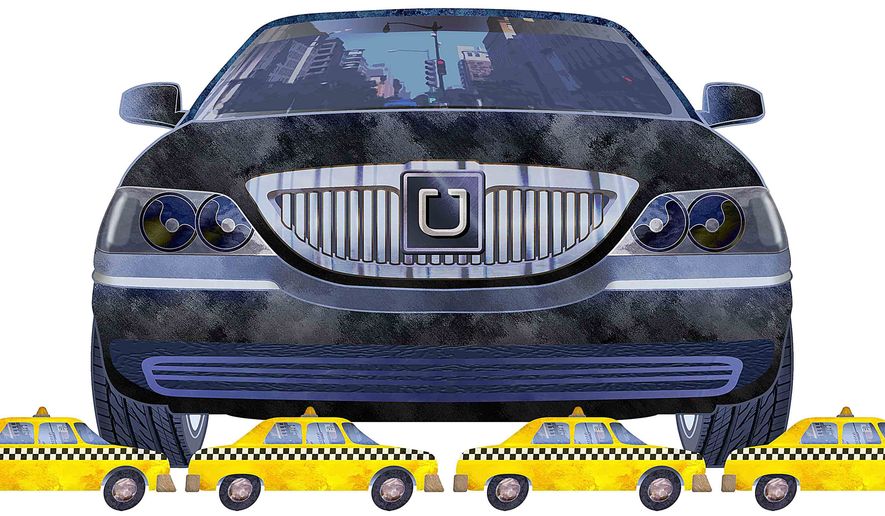OPINION:
Last week, the district attorneys in San Francisco and Los Angeles became the latest in a growing line of public officials to attempt to throw up roadblocks to popular mobile-app-based ride-share company Uber. The California injunctions allege fraud and misleading the public.
In New York, the City Council recently held hearings on the company, which has become the darling of the new “share economy.” New York officials believe that allowing Uber to operate means other traditional taxi services won’t have “a level playing field.” They’re also attacking the company’s practice of charging premium fares during certain times of day and criticizing executives for not sharing enough data with government agencies.
In Las Vegas, traditional taxicabs are using their cars to box in Uber vehicles until police can arrive, detain drivers and cite them for obscure violations. Similar practices are being used in the District of Columbia. Then there are complaints about training and background checks for drivers, which government officials continue to charge are woefully inadequate, even though the company has provided evidence that it meets or exceeds standards for traditional taxi firms.
The list goes on and on. Make no mistake: Government has declared war on Uber and, by extension, American innovation.
Why? Consumers love Uber — its incredible efficiency, the clean cars, the payment system and other aspects of the service. The company’s customer growth has been staggering. Uber’s leadership claims that the company will enable the creation of more than 1 million jobs next year in its more than 250-city operating area worldwide. It is leveraging the smartphone technology that has become a staple of daily life to provide consumers with more efficient, reliable service.
Attacks against Uber and similar companies demonstrate why America is lagging in innovation behind other countries. All too often, new products and new technologies are victims of attacks from governments slow to react to those advances and controlled by well-heeled interests.
In short, it’s about the industries threatened by innovation and their ability to leverage long-standing political influence in the form of money and votes.
The war against Uber is also an outgrowth of traditional political battle lines between liberals and conservatives pitting government regulation on one side with free market forces on the other. For America to maintain its status as a world leader, it must be an incubator for innovative products and technologies. Policy positions no longer can be made based on conservative or liberal ideology. Our elected officials need to reorient their thinking toward policy as either pro-consumer and pro-growth or anti-consumer and anti-growth. In this case, consumers throughout the world have spoken with their pocketbooks and smartphones. Allowing Uber to operate is a pro-consumer position.
When it comes to Uber, traditional taxicab operators, their unions and lobbyists have mounted a well-coordinated campaign of intimidation and coercion that is not acting in the best interest of the consumer. One might expect nothing less. The problem arises when elected officials fail to look objectively at the marketplace, the economic impacts and the benefits of innovation.
It might be news to them, but the only thing the cab companies are facing is an essential component of a free market economy: competition. Uber has threatened their business models in the same way that kerosene companies were ousted by electricity, and the horse-and-carriage industry was wiped out by the automobile.
The strength of American economic leadership rests either on a threatened industry’s willingness to embrace change and adapt to it or the willingness of government to allow competition and innovation to flourish. If both of those sets of conditions fail, then the economy and the consumer suffer.
Is it really government’s role to level the playing field by stifling innovative products and services the consumer demands, as the New York City Council is suggesting? Of course not.
Saving Uber isn’t just about one company, but giving all innovative products that aim to respond to market demand a fair chance to thrive without unjust government interference. At a time when an explosion of technology is changing the marketplace virtually every day, we either innovate or we fall victim to a debilitating self-restraint that means less productivity and a lower quality of life for everyone.
To be sure, this scenario has been a rude awakening for both Uber and the traditional taxi industry. The cabbies are trying to leverage decades of political capital with often weak-kneed officials instead of trying to improve their business models to compete with these products. These innovative companies are forced to fight pointless wars with government that, on their face, don’t seem to benefit anyone except the traditional cab companies. Both circumstances are problematic in their own ways.
America used to be about the people who invented and invested. We built bigger and better and set the standard for the world. Instead of rewarding those who build the better mousetrap, some in our government would rather desperately try to convince the American people that mice aren’t so bad.
That is a recipe for American decline.
• Brian Wise is a senior adviser with the U.S. Consumer Coalition.




Please read our comment policy before commenting.